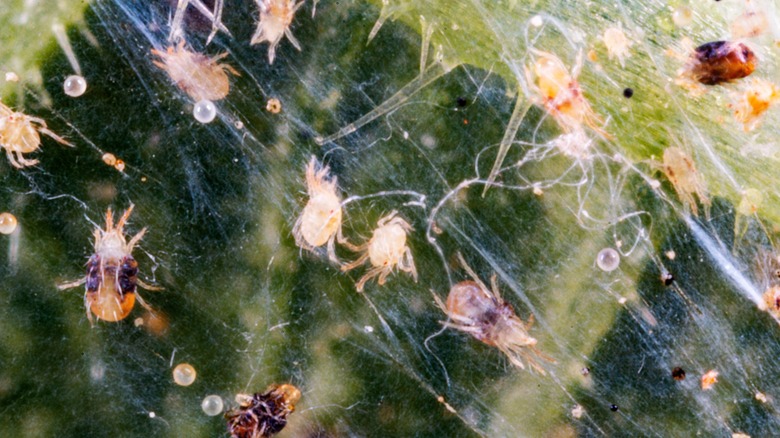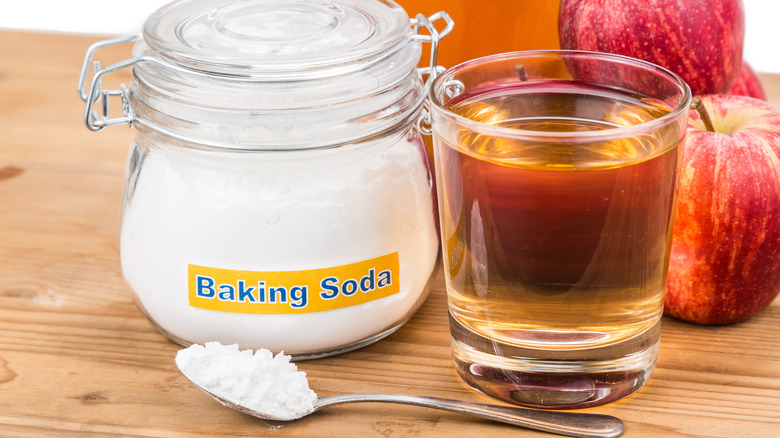Spider Mites Don't Stand A Chance Against These Two Common Kitchen Ingredients
As a passionate gardener, you're no stranger to the challenges nature can throw your way. But if there's one pest that can drive even the most seasoned green thumb to their wits' end, it's the tiny yet mighty spider mite. These minuscule arachnids might seem harmless at first glance, but they are, in fact, a bane for gardeners worldwide. Good thing they don't stand a chance against the powerful combination of apple cider vinegar (ACV) and baking soda.
Spider mites are tiny troublemakers who feast on the juices or sap of your beloved plants, leaving behind a trail of destruction in their wake. They thrive in warm, dry conditions and reproduce rapidly, which means they can quickly infest a garden, wreaking havoc on plant health and vitality. So, it's no wonder gardeners would try just about anything to get rid of them. As these tiny arachnids suck the life out of your plants, they leave them discolored, speckled, and weakened. Left unchecked, a spider mite infestation can lead to stunted growth, reduced yields, and, in severe cases, even plant death.
The ACV and baking soda anti-spider mite spray
Now, it's time to delve into the process of using apple cider vinegar mixed with baking soda to eliminate these garden-wreckers. To make this spider mite-killing spray, you'll need 3 tablespoons of ACV, a tablespoon of baking soda, some liquid dishwashing soap, and a liter of lukewarm water. Begin by mixing the ACV and baking soda with some liquid dishwashing soap in a small container. Stir in the lukewarm water to create a solution, and then transfer it to a spray bottle, ensuring it's well-mixed. You can then use this solution to spray on areas where spider mites seem to be hanging around (pun intended).
This concoction works due to the combination of ACV's acidity and the pest-killing attributes of baking soda. The ACV disrupts the spider mites' cell membranes, weakening and ultimately killing them. The baking soda enhances the effectiveness of ACV by drying out the pests, suffocating them with carbon dioxide, and acting as an abrasive that penetrates their bodies. Meanwhile, the liquid dish soap improves the adherence of the solution to the leaves, stems, or any plant parts you spray the solution on.
When you spray this mixture on your infested plants, it not only helps kill existing spider mites but also acts as a deterrent for future infestations. Repeat the application every few days until the infestation is under control.
Preventing spider mites in your garden
While the ACV and baking soda solution is a powerful solution you can use against spider mites, prevention is equally vital. To keep these pests at bay, maintain proper plant hydration. Spider mites thrive in dry conditions, so regularly water your plants, ensuring the soil stays consistently moist, but not waterlogged. If you spot any signs of infestation, promptly remove affected leaves and dispose of them properly, far from your garden.
Beneficial insects like ladybugs and predatory mites are known to feast on spider mites. Attract them to your garden by planting nectar-rich flowers or releasing them directly. Also, avoid planting the same species of plants in the same location year after year. Crop rotation can disrupt the lifecycle of spider mites. Frequent inspections can help you catch spider mite infestations in their early stages, making them easier to control.
The battle against spider mites can be challenging, but with the right tools and preventative measures, you can keep these tiny arachnids away from your plants. This ACV and baking soda solution is one of the most effective pest control measures you can use, and by combining it with good gardening practices, you can enjoy a lush and mite-free garden.



